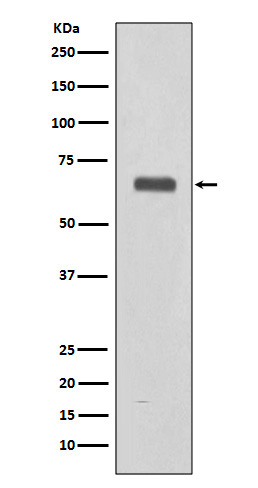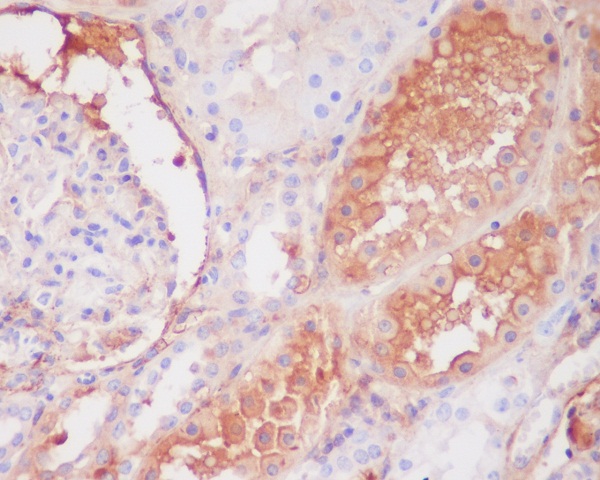

| WB | 咨询技术 | Human,Mouse,Rat |
| IF | 咨询技术 | Human,Mouse,Rat |
| IHC | 1/30-1/150 | Human,Mouse,Rat |
| ICC | 技术咨询 | Human,Mouse,Rat |
| FCM | 咨询技术 | Human,Mouse,Rat |
| Elisa | 1/5000-1/10000 | Human,Mouse,Rat |
| Aliases | Complement component C9; Comple Complement component C9bment component C9a;;Complement C9 |
| WB Predicted band size | Calculated MW: 63 kDa ; Observed MW: 70 kDa |
| Host/Isotype | Rabbit IgG |
| Antibody Type | Primary antibody |
| Storage | Store at 4°C short term. Aliquot and store at -20°C long term. Avoid freeze/thaw cycles. |
| Species Reactivity | Human |
| Immunogen | A synthesized peptide derived from human Complement C9 |
| Formulation | Purified antibody in PBS with 0.05% sodium azide,0.05% BSA and 50% glycerol. |
+ +
以下是3篇与LILRA2抗体相关的文献摘要概述:
---
1. **文献名称**:*LILRA2 regulates immune cell activation through interaction with HLA class I molecules*
**作者**:Chen et al. (2018)
**摘要**:该研究利用抗LILRA2的单克隆抗体,发现LILRA2通过识别HLA-I类分子调控单核细胞和中性粒细胞的炎症反应,提示其在自身免疫疾病中的潜在作用。
---
2. **文献名称**:*Expression and functional characterization of LILRA2 in systemic lupus erythematosus*
**作者**:Zhang et al. (2020)
**摘要**:通过抗LILRA2抗体检测患者外周血细胞,发现LILRA2在系统性红斑狼疮(SLE)患者中高表达,并参与促进促炎细胞因子分泌,可能与疾病活动度相关。
---
3. **文献名称**:*LILRA2 modulates T cell responses in chronic viral infections*
**作者**:Wang et al. (2021)
**摘要**:使用抗LILRA2抗体阻断实验,揭示LILRA2通过抑制T细胞受体信号通路削弱抗病毒免疫应答,为慢性病毒感染治疗提供新靶点。
---
如果需要具体文献DOI或补充信息,可进一步说明。
Leukocyte Immunoglobulin-Like Receptor A2 (LILRA2), a member of the LILR family, is a transmembrane glycoprotein expressed primarily on myeloid cells, including monocytes, macrophages, and dendritic cells. It interacts with HLA class I molecules and modulates immune responses by balancing activating and inhibitory signals. Unlike other LILRs, LILRA2 lacks a canonical intracellular signaling domain, relying instead on adaptor proteins like FcRγ for signal transduction. Its activation can promote pro-inflammatory cytokine release, phagocytosis, and antigen presentation, implicating it in both innate and adaptive immunity.
LILRA2 antibodies are critical tools for studying its role in diseases. Dysregulated LILRA2 expression is linked to autoimmune disorders (e.g., rheumatoid arthritis, lupus), neurodegenerative conditions (e.g., Alzheimer’s), and cancer. In autoimmune settings, antibodies targeting LILRA2 may block pathogenic signaling, while in cancer, they might enhance anti-tumor immunity by reactivating myeloid cells. However, challenges persist due to LILRA2’s genetic polymorphism and unclear ligand specificity. Recent research focuses on developing therapeutic monoclonal antibodies or nanobodies to modulate LILRA2 activity, aiming to exploit its dual role as an immune checkpoint or activator. Further studies are needed to clarify its context-dependent functions and optimize antibody-based interventions.
×